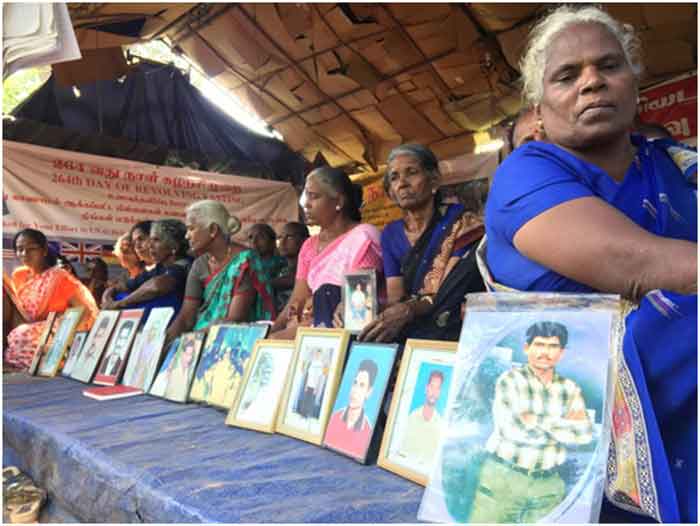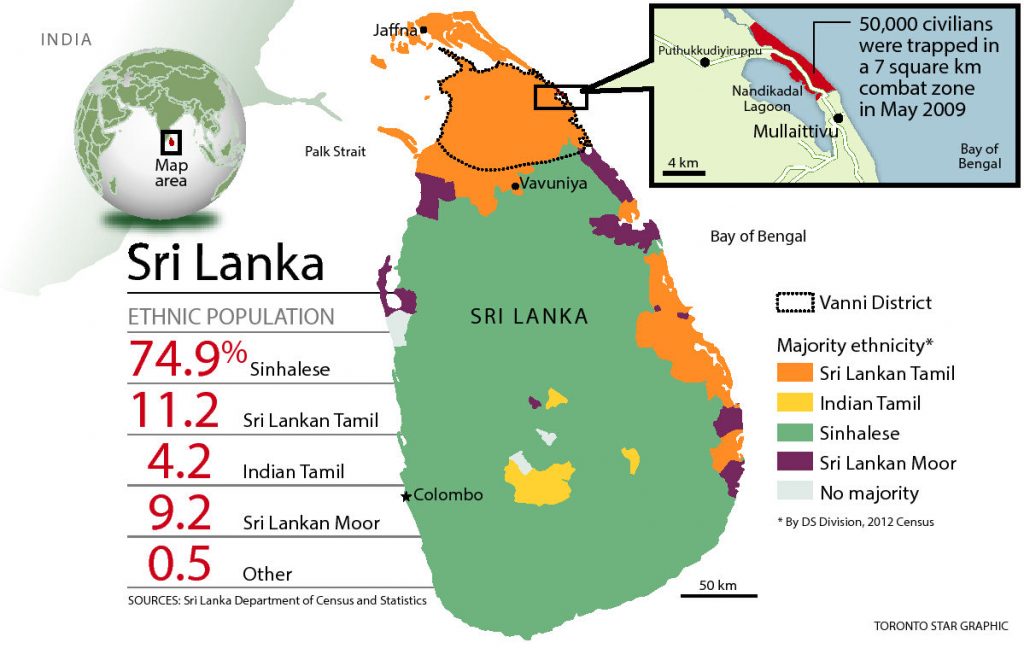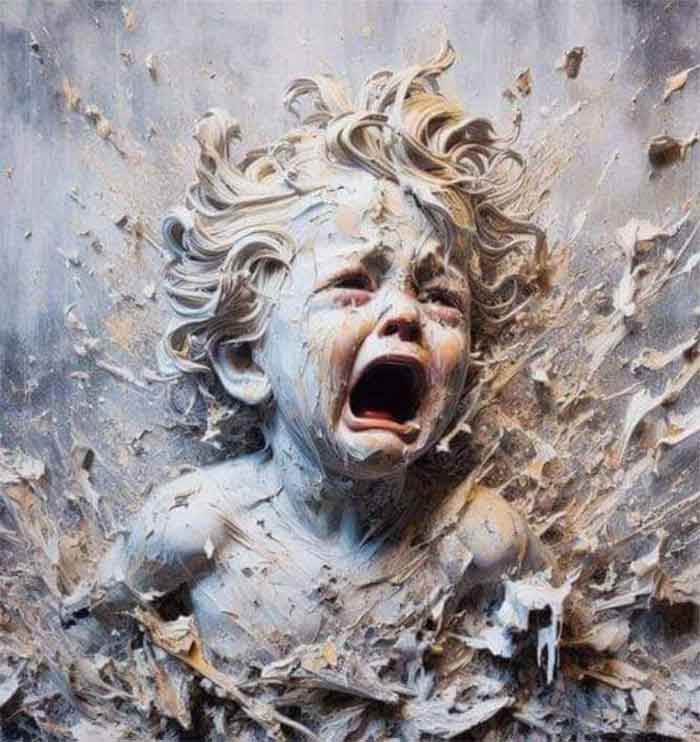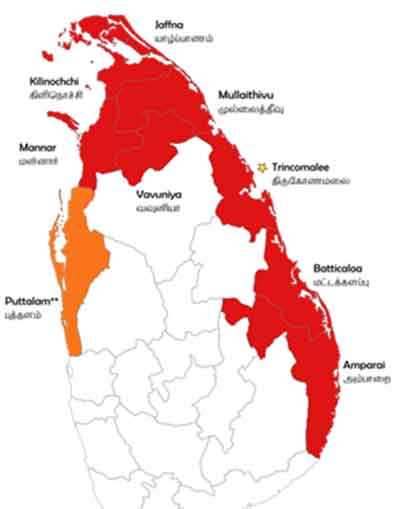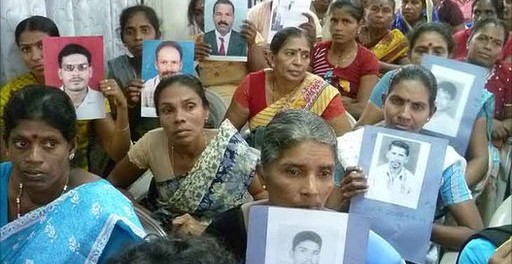
The United Nations, UN Human Rights Council and the International Community will now understand Sri Lanka’s policy of non-compliance of any recommendations of the UN or UNHRC.
The following long standing core issues still to be investigated and perpetrators punished,
- On the evening of January 02, 2006, amid New Year’s celebrations at Trincomalee beach Sri Lankan security forces shot and killed five high school students at point blank range. The Government quickly claimed, without evidence, that the youth killed were LTTE insurgents carrying out a grenade attack.
- On August 04, 2006 seventeen aid workers of the Action Farm {ACF] were killed
- Investigation for the killings of the Sunday Leader. Chief Editor Lasantha Wickrematunge on January 08, 2009
- Killing of Joseph Pararjasingam Member of Parliament of the Tamil National Alliance party on December 25th, 2005 – shot dead on Christmas day as he attended the midnight Christmas mass at St. Mary’s Cathedral, Batticaloa.
- Investigation on missing journalist and cartoonist Prageeth Eknaligoda went missing on January 24, 2010
Immediately after winning the November 2019 Presidential eletion, President Gotabaya Rajapakshe has pursued an increasingly majoritarian, militarized, authoritarian approach to governance. In his former capacity as Defense Secretary, Gotabaya Rajapakshe has been accused of involvement in war crimes during the final stages of the brutal war from 2006-2009.
In October 2020, Parliament passed the 20th Amendment to the constitution, which represents a major blow and assault on democratic governance and removed all checks and balances.
The mothers, fathers, relatives of the missing are on the streets for more than 1800 days in a sit-in protest demanding to know the whereabouts of their loved ones. They are holding EU, US & UN Flags and the pictures of their loved ones who are missing. Successive Governments have failed to take any action and the much-anticipated Office of the Missing Persons [OMP] is now defunct after the new regime of Rajapakshas, although the OMP was toothless with no powers to prosecute, charge or punish the culprits.
It is very unfortunate that the very old mothers, fathers and relatives are still pinning their hopes and trusting the UNHRC, UN and the International community to find justice and there seems to be no progress or action to the burning problems affecting the elderly people.
Following the international investigation in September 2015, the United Nations released a major report on serious human rights violations committed during the final stages of the war during 2002-2015.
Two glaring examples of serious human rights violations where the perpetrators remain free from prosecution are the alleged extrajudicial execution of five high school students in Trincomalee by the Sri Lankan Special Task Force in January 2012, and the killing of 17 Action Contre la Faim (ACF) workers in the east in 2006, one of the worst massacres of humanitarian workers in history.
The two most widely publicized killings relate to IPS UN Bureau Chief in Colombo, Richard de Zoysa, 30, in February 1990, and the Editor-in-Chief of the Sunday Leader Lasantha Wickrematunge, in January 2009.
But both murders remain unsolved—due primarily to political coverups — despite several leads pointing to the killers.
As fate would have it, the politician who apparently ordered the killing of de Zoysa, and the police officer who executed that order both died in a suicide bomb blast in 1993, three years after de Zoysa’s murder.
But the rest of the conspirators are still on the loose and fugitives from justice.
The New York-based Committee to Protect Journalist (CPJ), which has an arresting headline on its website titled “Sri Lanka: Where Journalists are Killed with Impunity,” lists the killings of 25 Sri Lankan journalists since 1992, with 19 where “motives were confirmed” and six with “motives unconfirmed.”
David Kaye, the UN Special Rapporteur on The promotion and protection of the right to freedom of opinion and expression’, called on governments “to investigate and hold accountable all those responsible for attacks on journalists.”
Senior figures in the Sri Lankan Government, from the President to the Defense Secretary, have repeatedly said that they will protect the military from prosecution for crimes. No security sector reform has taken place, and individuals accused of human rights violations occupy key positions in the government and the armed forces. Changes to the Constitution which reduce the independence of key institutions and increasing political interference in the judicial process are a serious concern.
Victims and survivors have already been waiting more than ten years for justice. Pardons, delays, and collapse of the few cases that are before the courts show that the domestic justice system is not capable of delivering justice alone.
According to a UN estimate more than 70,000 civilians were killed during the last months of the war. During this period of massacres amounting to genocide, UN did not hold a single meeting, not at the Security Council, not at the General Assembly, not even at the UN Human Rights Counil.
Now the UN and UNHRC are searching for answers for these fatal lapses and dereliction of responsibilities. Even the lessons from the Rwanda genocide in 1995 and Srebrenica did not matter to UN.
The last 12 years have fully affirmed a broder history were Sri Lankais unlikely to offer a just and lasting political settlement to the long outstanding Tamil National Question, in the meantime, it continues with its long history of deception in formulating a solution to the conflict.
Currently the situation for Tamils in Sri Lanka is very bleak. The Military occupation [at the ratio of one soldier to every five civilians: 01 : 05] of the Tamil homeland has made it impossible for the Tamil people to advance their basic democratic rights. Tamils living in the North and East and all over the island continue to live in fear of persecution and uncertainty. They are constantly reminded that they are second class citizens in their own land. Not surprisingly, thousands of Tamil continue to flee the country in boats and ships risking their lives seeking refuge in other countries.The prospects of Sri Lanka seriously addressing the reasonable political aspirations of the Tamils are becoming dim and uncertain unless the UN, UNHRC and the International Community intervene and take drastic actions against Sri Lanka.
The United Nations, UN Human Rights Council and the International Community have moral duties and obligations to formulate a political solution that will meet the aspirations of the Tamil people through democratic means. An internationally monitored referendum will allow the Tamils to choose their political destiny and is the pragmatic option to address the decades long conflict in the island. An international precedent for a referendum can be found in the recent South Sudan and East Timor where a peaceful and just resolution was democratically established after many years of conflict.
It should be noted that ethnic cleansing in Sri Lanka is for the creation of a mono ethnic BUDDHIST SINHALA STATE.
It is the master plan to flush out all other religious, linguistic nationalists out of Sri Lanka to create a mono-ethnic BUDDHIST ETHNIC 100% BUDDHIST SINHALESE NATION OF SRI LANKA.
ALL WHAT THE TAMILS ARE ASKING THE UN, UNHRC AND THE INTERNATIONAL COMMUNITY IS THEIR FREEDOM TO EXERCISE THEIR ASPIRATIONS WHICH IS FUNDAMENTAL COVENANT OF HUMAN LIFE. iT MUST BE, FOR THE WORLD TO PROGRESS SHOULD BE RELEASE THE PEOPLE FROM RACISM, FEUDALISM, FANATICISM AND ALL OTHER NEGATIVE “ISSIMS”.
Kumarathasan Rasingam – Secretary, Tamil Canadian Elders for Human Rights Org

